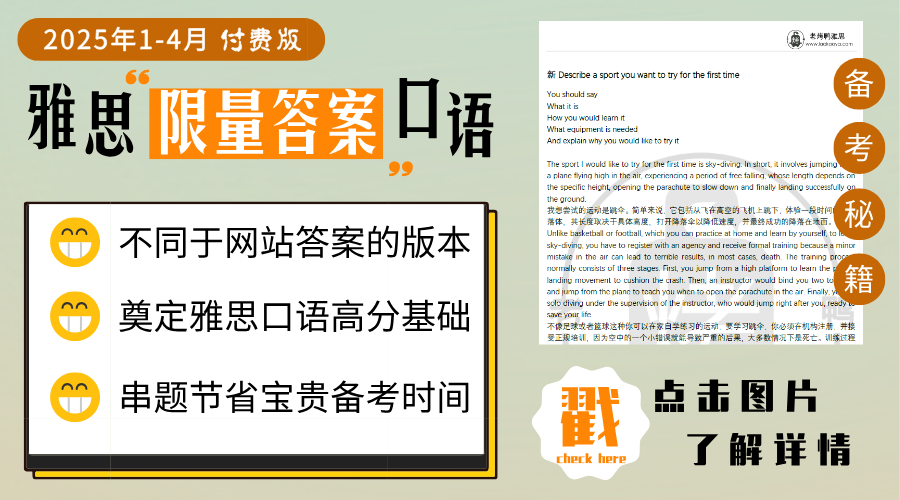剑桥雅思17Test2Part3听力原文与答案 Romeo and Juliet
剑桥雅思17听力第二套题目第三部分的主题为两名戏剧专业的学生讨论罗密欧与朱丽叶。具体内容包括他们的回顾要点,对戏剧各个部分的评价,以及对其广泛传播的原因的思考。下面是这段音频对应的录音原文与答案。
点击查看这篇雅思听力中出现的常考词汇与对应的答案解析:
剑桥雅思17Test2Part3听力高频词汇 Romeo and Juliet
剑桥雅思17Test2Part3听力答案解析 Romeo and Juliet
剑桥雅思17 Test2 Part3雅思听力原文
ED: Did you make notes while you were watching the performances of Romeo and Juliet, Gemma?
GEMMA: Yes, I did. I found it quite hard though. I kept getting too involved in the play.
ED: Me too. I ended up not taking notes. I wrote down my impressions when I got home. Do you mind if I check a few things with you? In case I’ve missed anything. And I’ve also got some questions about our assignment.
GEMMA: No, it’s good to talk things through. I may have missed things too.
ED: OK great. So first of all, I’m not sure how much information we should include in our reviews.
GEMMA: Right. Well, I don’t think we need to describe what happens. Especially as Romeo and Juliet is one of Shakespeare’s most well-known plays.
ED: Yeah, everyone knows the story. In an essay we’d focus on the poetry and Shakespeare’s use of imagery etc., but that isn’t really relevant in a review. We’re supposed to focus on how effective this particular production is.
GEMMA: Mmm. We should say what made it a success or a failure.
ED: And part of that means talking about the emotional impact the performance had on us (Q21). I think that’s important.
GEMMA: Yes. And we should definitely mention how well the director handled important bits of the play – like when Romeo climbs onto Juliet’s balcony (Q22).
ED: And the fight between Mercutio and Tybalt (Q22).
GEMMA: Yes. It would also be interesting to mention the theatre space and this article is from laokaoya website, how the director used it but I don’t think we’ll have space in 800 words.
ED: No. OK. That all sounds quite straightforward.
ED: So what about The Emporium Theatre’s production of the play?
GEMMA: I thought some things worked really well but there were some problems too.
ED: Yeah. What about the set, for example?
GEMMA: I think it was visually really stunning (Q23). I’d say that was probably the most memorable thing about this production.
ED: You’re right. The set design was really amazing (Q23), but actually I have seen similar ideas used in other productions.
GEMMA: What about the lighting? Some of the scenes were so dimly lit it was quite hard to see.
ED: I didn’t dislike it. It helped to change the mood of the quieter scenes (Q24).
GEMMA: That’s a good point.
ED: What did you think of the costumes?
GEMMA: I was a bit surprised by the contemporary dress (Q25), I must say.
ED: Yeah – I think it worked well, but I had assumed it would be more conventional (Q25).
GEMMA: Me too. I liked the music at the beginning and I thought the musicians were brilliant, but I thought they were wasted because the music didn’t have much impact in Acts 2 and 3 (Q26).
ED: Yes – that was a shame (Q26).
GEMMA: One problem with this production was that the actors didn’t deliver the lines that well. They were speaking too fast (Q27).
ED: It was a problem I agree, but I thought it was because they weren’t speaking loudly enough – especially at key points in the play (Q27).
GEMMA: I actually didn’t have a problem with that.
ED: It’s been an interesting experience watching different versions of Romeo and Juliet, hasn’t it?
GEMMA: Definitely. It’s made me realise how relevant the play still is.
ED: Right. I mean a lot’s changed since Shakespeare’s time, but in many ways nothing’s changed. There are always disagreements and tension between teenagers and their parents (Q28).
GEMMA: Yes, that’s something all young people can relate to – more than the violence and the extreme emotions in the play.
ED: How did you find watching it in translation?
GEMMA: Really interesting. I expected to find it more challenging, but I could follow the story pretty well.
ED: I stopped worrying about not being able to understand all the words and focused on the actors’ expressions. The ending was pretty powerful (Q29).
GEMMA: Yes. That somehow intensified the emotion for me (Q29).
ED: Did you know Shakespeare’s been translated into more languages than any other writer?
GEMMA: What’s the reason for his international appeal, do you think?
ED: I was reading that it’s because his plays are about basic themes that people everywhere are familiar with.
GEMMA: Yeah, and they can also be understood on different levels (Q30). The characters have such depth.
ED: Right – which allows directors to experiment and find new angles (Q30).
GEMMA: That’s really important because …
剑桥雅思17 Test2 Part3雅思听力答案
21-22. DE
23. D
24. C
25. A
26. E
27. F
28. B
29. C
30. C
剑桥雅思17Test2Part1听力原文与答案 Opportunites for voluntary work in Southoe village
剑桥雅思17Test2Part2听力原文与答案 Oniton Hall
剑桥雅思17Test2Part4听力原文与答案 The impact of digital technology on the Icelandic language


